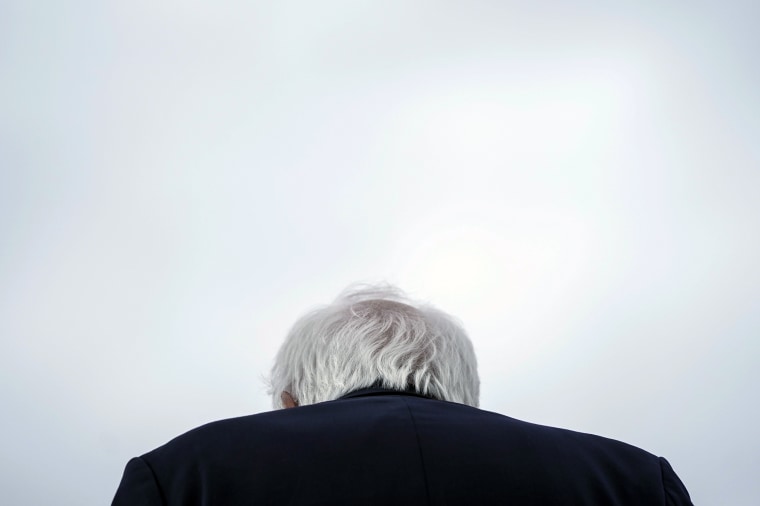In the end, Bernie Sanders couldn't win for losing.
So he dropped out and fully cleared the way for Joe Biden to take on President Donald Trump head-to-head, unofficially kicking off the general election.
The iconoclastic progressive's decision to suspend his campaign for the Democratic presidential nomination Wednesday came at a time when the coronavirus had rendered him unable to ask for votes without encouraging supporters to risk their lives to try to overturn Biden's big delegate lead.
Trailing badly, he had three options: try to inflict irreparable damage on Biden, who is now the apparent party nominee; lose while voters donned protective masks — and mailed in ballots in states where that is not past practice — to make their pick; or drop out.
"If I believed we had a feasible path to the nomination, I would certainly continue the campaign, but it’s just not there," Sanders said, adding that he understands the position of those backers who wanted him to continue fighting for the nomination.
Trump was quick to try to divide Democrats.
"This ended just like the Democrats & the DNC wanted, same as the Crooked Hillary fiasco," he tweeted. "The Bernie people should come to the Republican Party, TRADE!"
The fall of Sanders is the coda to one of the most dramatic turnarounds in modern political history. He came in a close second to Pete Buttigieg in Iowa and won New Hampshire and Nevada convincingly before Biden romped to victory in South Carolina and quickly consolidated enough backing from the rest of the party to demonstrate that Sanders had an impenetrably hard ceiling of support.
Download the NBC News app for breaking news and politics
Despite having now lost two primaries in a row, Sanders insisted that he and his voters had won the "ideological struggle" of convincing Americans that there should be a universal, single-payer health insurance program, a minimum wage of $15 an hour and affordable higher education for everyone.
But it's not clear how much will practically change about the campaign, as Sanders vowed to remain on the ballot and attempt to pick up more delegates to the Democratic convention as a means of gaining leverage to influence Biden's platform and future elections.
Trump jumped on that, too.
"Wow, Bernie is unwilling to give up his delegates, and wants more of them!" Trump tweeted. "What’s that all about?"
After five years of seeking the presidency, and with one of the most committed political bases in American politics, Sanders acknowledged that it was painful to accept the writing on the wall. But even the senator from Vermont, who is still fighting off the belief among many Democrats that his long and bitter 2016 campaign against Hillary Clinton helped elect Donald Trump, had to understand that his continued candidacy would be increasingly viewed as a vanity project.
"This campaign has never been about me," he said in what appeared to be a nod to critics who have said his campaign had ceased to have purpose other than serving his own political interests.
Instead, by dropping out, he liberates himself to focus on the coronavirus battles going on in Congress, where the authority to spend more than $6 trillion of taxpayer money already has been approved and plans for more legislation are under discussion.
In a time of desperation for the country, with more than 12,000 dead of the disease and the economy imploding from the bottom up, Sanders was in a political box. He voted for that last stimulus law, which many critics believe will exacerbate the disparities between rich and poor that he often rails against. But voting down aid for workers and the unemployed, despite his reservations about assistance given to the top of the economic ladder, was untenable for a candidate running for president.
Not a single member of the Senate or House registered a vote against it.
Now, Sanders is freer to use his platform without the constraints of trying to win higher office. Whether that will affect his votes remains to be seen, but it will certainly remove a pressure point.
"As I see the crisis gripping the nation," he said, "I cannot in good conscience continue to mount a campaign that cannot win and which would interfere with the important work required of all of us in this difficult hour."
If anything, Sanders may be a more vocal advocate for his worldview as a senator than he was as a presidential candidate over the last several weeks. But he won't be president, or even the Democratic nominee.
He'll have to settle for trying to influence Biden.

